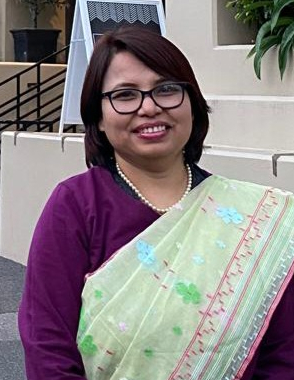Mir Taifa Siddika
Women Trailblazers in Logistics (July 2025)"

Women Trailblazers in Logistics (July 2025)"

Mir has had an extensive civil services career, working across departments, sectors and desks. From the Ministry of Railways to Finance, from Foreign Affairs to now the Prime Minister’s office where she works as the Director, Mir has been at the heart of Bangladesh’s development and political journey for the last 19 years. Mir’s journey is inspiring, not just as a skilled professional, but also as a woman who has had to navigate complex societal structures and power dynamics in a patriarchal culture. She expresses how culture in Bangladesh tends to be quite conservative at times. She also points out that there are very theoretical conversations on gender equity within her society, but they are quite difficult to carry through as mainstream practice.
Mir participated in the Women Trailblazers in Logistics program, a unique two-week leadership course for women across South Asia, aimed at bringing transport and logistics professionals together to collaborate, support and uplift each other. The course brought together women in the logistics domains from public and private sectors. Mir’s training experience with SARIC holds a special place in her heart. Civil servants in Bangladesh are often required to attend upskilling courses and workshops.
The course had a special focus on helping women create their own unique leadership style and help envision themselves as dynamic pioneers in their workplaces. For Mir, that means creating a workplace that is welcoming for all, especially women, and that fosters a collaborative, open atmosphere. “Leadership is not just about giving instructions; it’s about being a team member first and helping others get over their vulnerabilities and then grow as a person yourself. I want to figure out how to acknowledge the differences we often have in any group and work effectively by building trust between those group members. I hope I can inspire other women officers in government services to step up and help them become better leaders in their own right."
Mir also sees SARIC trainings and the alumni network as an important resource for women participants to tap into. South Asia as a region may comprise of different countries, but they all have certain parallels and similarities regarding women empowerment and inequalities, creating the perfect opportunity to show solidarity and encourage each other to be the best version of themselves. She concludes, “ As South Asian countries, we have similar cultures, where women have to often encounter close-minded environments where their participation is discouraged. Beyond that, our countries are already closely tied in terms of geography, trade, economic activities. So, it is absolutely essential that we figure out how to interact and collaborate effectively. All the other participants on the course are very dear to me; they were so humble and kind, and they have achieved so much already! Interacting with these inspirational women from different countries made my time in Australia really memorable.”